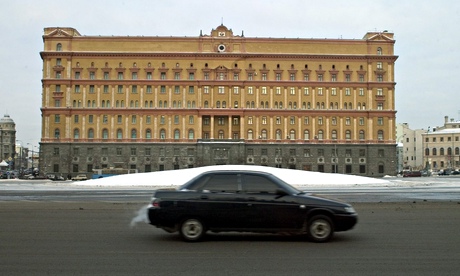
Russia’s secret surveillance programmes came under the scrutiny of the European court of human rights on Wednesday when a journalist brought a case complaining about pervasive state snooping on mobile phone calls.
Under Russian legislation the Kremlin’s powerful FSB spy agency is able to intercept domestic telephone calls and can collect emails, texts and other data.
Russian law compels mobile phone providers to install special equipment which allows the agency to conduct remote eavesdropping using a system known as Sorm. The country’s spy agencies are not obliged, however, to inform operators about their targets.
The court in Stasbourg heard a complaint from Roman Zakharov, a journalist based in St Petersburg, who said the law allowing wide-ranging secret powers to monitor mobile phones violated his right to privacy under article eight of the European convention on human rights.
He also contended that parts of the law governing interception and passed in 1999 had never been made public.
Zakharov, a journalist with the Glasnost Defence Foundation, a human rights organisation that defends the rights of reporters, first took his complaint against the FSB and Russia’s communications ministry to St Petersburg’s district court in 2003.
The court threw out his complaint three years later, arguing that he could not prove he had been a victim of surveillance. He then appealed to Strasbourg.
In a sign of the case’s importance, the court’s rarely convened grand chamber met to consider Zakharov’s application. Outlining the journalist’s argument, Philip Leach, director of the European Human Rights Advocacy Centre, said that the secret monitoring of communications in Russia directly affected everybody.
He said that since the legislation had been passed the volume of electronic data available to the FSB (the successor to the KGB) had grown enormously, with the rise of text messages and emails, as well as Twitter, Facebook, Youtube and instant messaging.
“Information revealed by Edward Snowden has shown the extent to which governments are capable of carrying out mass surveillance programmes, often without individual warrants,” he told the court.
Leach added that in certain circumstances Russia’s spy agencies eavesdropped on a target without judicial authorisation. He said that the FSB did seek court approval for interception in some instances, but he described scrutiny by Russian judges as “woefully inadequate”.
Leach said that journalists and human rights organisations frequently faced state harassment in Russia, with much of the media under the control of political authorities. About 56 journalists had been murdered since 1992, he said, and there was a culture of impunity that was rampant.
There had been practically no prosecutions against those who meted out violence against reporters. The Russian president, Vladimir Putin, had also introduced laws compelling non-governmental organisations that had western funding to register themselves as “foreign agents”, Leach said.
Acting for the Kremlin, Georgy Matyushkin told the grand chamber that the case was inadmissable since Zakharov had not exhausted his options under Russian law. He said the journalist had failed to prove that he had been spied on.
Defending the FSB’s practices, Matyushkin claimed the agency intercepted the calls of a fairly narrow group of individuals. They were identified on the reasonable basis of suspicion of a crime or as a threat to the state. He claimed that Russian legislation was not at odds with European law.
The FSB carries out widespread surveillance against anyone it considers an enemy of the state. The list typically includes opposition activists, foreign journalists, western diplomats, Russian staff at European and American embassies, as well as many other groups.
The agency also carries out a range of other techniques, most of them dating from the KGB era, such as demonstrative break-ins or “house intrusions”, physical surveillance, and harassment. Before becoming prime minister in 1999, Putin was head of the FSB, at the time when semi-secret legislation governing surveillance became law.
Snowden’s arrival in Russia last year and subsequent exile has drawn attention to Russia’s own clandestine data gathering programmes.
In a live phone-in during April, Snowden asked Putin directly if the Kremlin had carried out mass surveillance similar to the spying conducted by America’s national security agency. Putin said the Kremlin had not done this, and the FSB’s activities were strictly regulated by law, adding that “you have to get court permission to stalk a particular person”.
Zakharov was at the hearing on Wednesday. He said: “I hope that the court can find a balance of interests between citizens’ rights and security. Currently these rights are not properly protected. Worse still, government authorities, in Russia and abroad, fail to understand that a lack of transparency with regards to special methods of investigation, such as phone tapping or reading emails, leads to inefficacy in policing and the secret services, the very same structures the methods are seeking to aid.”
Leach added: “The FSB’s very broad surveillance powers are simply not subject to adequate controls. There is no proper judicial authorisation procedure, no independent scrutiny and no legal redress for victims. The system needs to be completely overhauled.”
The court will rule on the case later.

